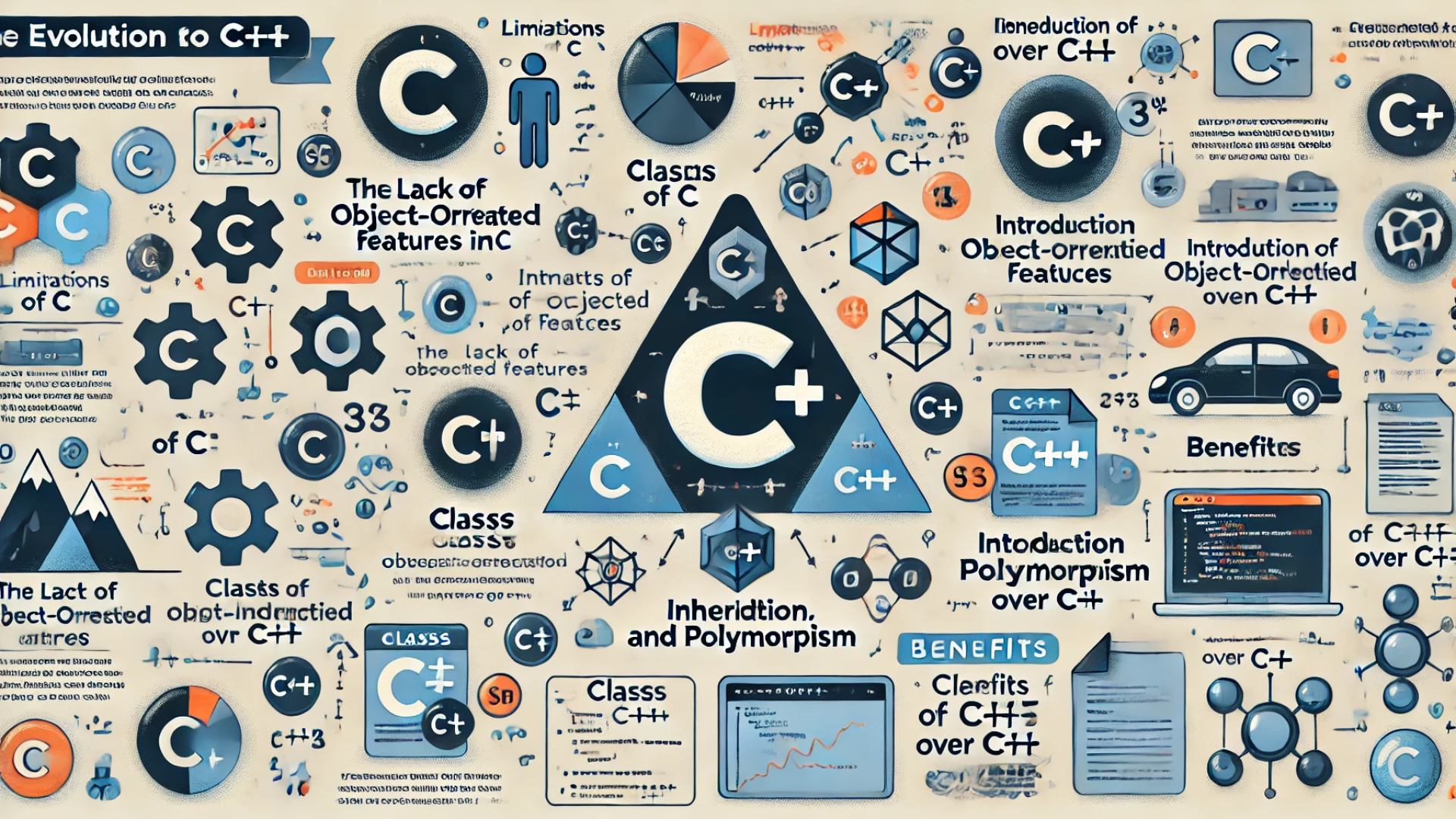
C and Its Limitations
C, developed in the early 1970s, is a powerful, efficient, and flexible programming language. It quickly became the backbone of many software systems due to its ability to perform low-level memory manipulation and its straightforward syntax. However, as software complexity grew, C’s limitations became apparent.
Key Limitations of C:
- Lack of Object-Oriented Features: C is a procedural language, which means it follows a step-by-step approach to execute a program. This approach doesn’t scale well with the increasing complexity of software systems.
- Code Reusability: Without object-oriented concepts, reusing code across projects is challenging.
- Data Security: C lacks strong encapsulation features, making it harder to protect data from unintended access or modification.
The Birth of C++
Bjarne Stroustrup developed C++ in the early 1980s to address the shortcomings of C. The goal was to create a language that combined the efficiency and control of C with modern programming concepts like object-oriented programming (OOP).
Why Update to C++?
- Object-Oriented Programming (OOP): C++ introduced classes and objects, which help organize complex programs into manageable, reusable code.
- Encapsulation: By bundling data and methods that operate on the data within classes, C++ ensures better data protection and integrity.
- Inheritance: This allows new classes to inherit properties and behaviors from existing classes, promoting code reuse and reducing redundancy.
- Polymorphism: C++ enables methods to do different things based on the object it is acting upon, making programs more flexible and easier to extend.
Key Features of C++
Classes and Objects:
C++ allows developers to define classes, which are blueprints for creating objects. Objects are instances of classes that can represent real-world entities.
Example:
class Car {
public:
string brand;
string model;
int year;
void displayInfo() {
cout << brand << " " << model << " " << year << endl;
}
};
int main() {
Car car1;
car1.brand = "Toyota";
car1.model = "Corolla";
car1.year = 2020;
car1.displayInfo();
return 0;
}Inheritance:
Inheritance allows a class to inherit properties and behaviors from another class, fostering code reuse and logical hierarchy.
Example:
class Vehicle {
public:
string brand;
void honk() {
cout << "Honk! Honk!" << endl;
}
};
class Car : public Vehicle {
public:
string model;
int year;
};
int main() {
Car car1;
car1.brand = "Toyota";
car1.model = "Corolla";
car1.year = 2020;
car1.honk();
return 0;
}Polymorphism:
C++ supports polymorphism, allowing methods to behave differently based on the object they are acting upon.
Example:
class Animal {
public:
virtual void makeSound() {
cout << "Animal sound" << endl;
}
};
class Dog : public Animal {
public:
void makeSound() override {
cout << "Woof" << endl;
}
};
class Cat : public Animal {
public:
void makeSound() override {
cout << "Meow" << endl;
}
};
int main() {
Animal* animal1 = new Dog();
Animal* animal2 = new Cat();
animal1->makeSound();
animal2->makeSound();
delete animal1;
delete animal2;
return 0;
}Benefits of C++ Over C
- Enhanced Code Reusability: Through inheritance and polymorphism, C++ promotes the reuse of code, making development faster and reducing errors.
- Better Data Management: Encapsulation in C++ ensures data is protected and accessible only through defined interfaces.
- Modularity: C++’s object-oriented nature allows developers to break down complex problems into smaller, manageable pieces.
- Standard Library: C++ comes with a rich standard library that provides numerous functions and data structures, reducing the need to write code from scratch.
Impact on Software Development
The evolution from C to C++ significantly impacted software development, making it easier to manage large codebases and develop more complex software systems. C++’s object-oriented features have become fundamental in developing modern software, influencing many other languages like Java, C#, and Python.
Conclusion
C++ emerged as an evolution of C to address its limitations, introducing powerful features that support modern programming needs. By incorporating object-oriented principles, C++ offers enhanced code reusability, better data management, and modularity, making it a cornerstone of contemporary software development.
FAQs:
- Why was C++ created?
C++ was created to provide object-oriented features and address the limitations of C, such as lack of code reusability and data security. - Can I still use C for programming?
Yes, C is still widely used, especially in system programming and applications where low-level memory manipulation is critical. - Is C++ harder to learn than C?
C++ can be more complex due to its additional features, but it also offers more tools to manage that complexity effectively.

